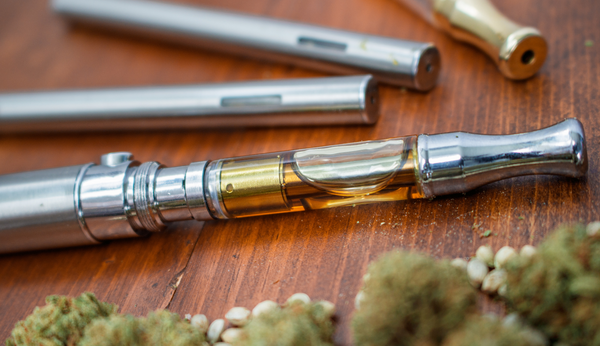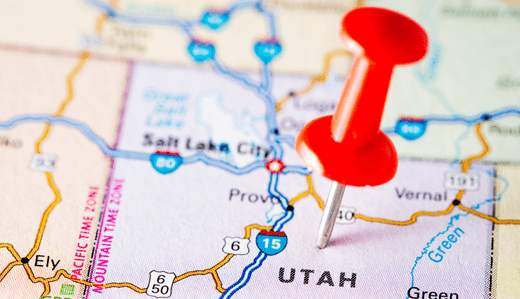Your Cart is Empty
FREE SHIPPING ON ALL ORDERS $75+
Hemp and hemp-derived cannabinoids are legal according to federal law, but every state governs hemp differently. Is Delta-8-THC legal in Utah?
Unfortunately, no.
All tetrahydrocannabinols (including Delta-8-THC) are considered Controlled Substances in Utah. That means that like neighboring states Arizona and Nevada, you probably can’t access Delta-8 in Utah.
Here’s what you should know about Utah’s Delta 8 laws:
Disclaimer: We’re always working to stay informed on the latest Delta-8 laws and research. However, state laws are subject to change and we advise that you do your own research to verify the information you find in this article. This is not intended as legal advice.
Utah Delta-8 Laws
Is Delta-8 a Controlled Substance in Utah?
Delta-8-THC Possession Limits in Utah
Is Delta-9-THC Legal in Utah?
Where to Buy Delta-8 in Utah
Is Delta-8 Legal in All 50 States?
Resources
Utah updated their hemp laws in response to federal updates to the Farm Bill. Like many other states, Utah has legalized hemp on a broad scale, which means that many hemp constituents (like CBD) are legal in the state.
Unfortunately, Utah fails to make any exception for hemp-derived tetrahydrocannabinols in its Controlled Substances Act. The legislation reads that all isomers of THC are considered Controlled Substances, which means that Delta-8-THC is not legal in Utah.
Here are some snippets from Utah Delta-8 laws:
As in effect on October 1, 2019
(6) “Industrial Hemp”: means the plant Cannabis sativa L. and any part of such plant, whether growing or not, with a delta-9 tetrahydrocannabinol concentration of not more than 0.3 percent on a dry weight basis.
(AA) Tetrahydrocannabinols, naturally contained in a plant of the genus Cannabis (cannabis plant), as well as synthetic equivalents of the substances contained in the cannabis plant, or in the resinous extractives of Cannabis, sp. and/or synthetic substances, derivatives, and their isomers with similar chemical structure and pharmacological activity to those substances contained in the plant, such as the following: ∆1 cis or trans tetrahydrocannabinol, and their optical isomers ∆6 cis or trans tetrahydrocannabinol, and their optical isomers ∆3,4 cis or trans tetrahydrocannabinol, and its optical isomers, and since nomenclature of these substances is not internationally standardized, compounds of these structures, regardless of numerical designation of atomic positions covered;

Yes. Utah does not make any exceptions for hemp-derived cannabinoids in the Controlled Substances Act, which is usually the defining factor in states where Delta 8 is legal. All tetrahydrocannabinols and their optical isomers are Controlled Substances according to Utah Delta 8 laws.
Because Delta-8 is illegal in Utah, there are no defined possession limits for the cannabinoid.
Utah voters approved Proposition 2 in 2018, which set the stage for legal medicinal cannabis (delta-9-THC) in the state. Qualifying patients can access medical marijuana on a limited basis, but recreational cannabis is still illegal.
Illegal possession of cannabis can be charged with a Class B misdemeanor, which carries a sentence of up to 6 months in jail and/or fines of up to $1,000.

Delta-8-THC is illegal in Utah and cannot be legally purchased in the state.
In places where Delta-8-THC is legal (like in neighboring state Wyoming), many people prefer to shop online. It's advisable to proceed with caution when choosing a Delta-8 distributor. Shopping online allows you to buy directly from a brand or manufacturer, instead of purchasing through a third-party vendor that may not fully understand Delta-8 effects and uses or the laws surrounding Delta-8 products.
At Vida Optima, our Delta-8-THC products comply with all parameters of the Hemp Farming Act of 2018. That means they are legal to buy online from any area where Delta-8 is legal.
We can also help answer questions about Delta-8, or you can read our “What is Delta-8-THC?” guide to learn everything you need to know.
Yes! The 2018 Farm Bill officially legalized hemp and all hemp derivatives, like cannabinoids, isomers, and other extracts. That means that Delta-8-THC derived from hemp that contains less than 0.3% Delta-9-THC is legal according to federal laws.
Delta-8-THC is currently federally legal under the context of the Hemp Farming Act of 2018, but each state has the right to determine its own stance on tetrahydrocannabinols derived from hemp. Delta-8-THC is illegal in Utah according to state law, but you should read more about Delta-8 laws by state to determine the legality in other areas.
No, Delta-8 THC is illegal in Utah. The state law classifies all tetrahydrocannabinols, including Delta-8 THC, as controlled substances, which makes the sale, possession, and use of Delta-8 products illegal.
Delta-8 THC is banned in Utah due to the state's strict regulations on tetrahydrocannabinols. Utah classifies Delta-8 as a controlled substance under its Controlled Substances Act, aiming to regulate and restrict synthetic cannabinoids and other chemically modified substances.
No, you cannot legally fly with Delta-8 THC to Utah. Since Delta-8 is illegal in the state, possessing it upon arrival could result in legal consequences. It is crucial to comply with the laws of both the departure and destination states.
Delta-8 THC is illegal in several states, including Alaska, Colorado, Delaware, Idaho, Iowa, Montana, New York, North Dakota, Rhode Island, Utah, Vermont, and Washington.
Delta-9 THC is also highly regulated in Utah. It is only legal for medical use by registered patients under the state’s medical cannabis program. Recreational use of Delta-9 THC remains illegal in Utah.
Delta-11 THC is not explicitly regulated in Utah, but it is likely treated similarly to other tetrahydrocannabinols. Given Utah's strict stance on cannabinoids and synthetic substances, Delta-11 THC is likely considered illegal. Always check the latest state laws for updates and specifics regarding Delta-11.
Comments will be approved before showing up.



